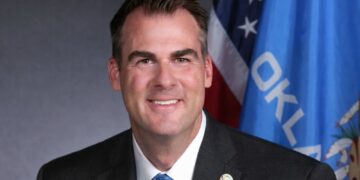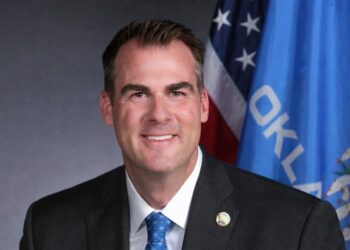OKLAHOMA CITY (OBV) – The Oklahoma House of Representatives overwhelmingly voted to prohibit cell phone use in public schools, a major step in the growing movement to get students more focused on school work.
House Bill 1276 succeeded in the House with an 82-9 vote. The legislation now moves to the Oklahoma State Senate for consideration.
HB 1276, written by Rep. Chad Caldwell, R-Enid, seeks to eliminate classroom distractions and improve student mental health by prohibiting the use of cell phones and other electronic devices, including smartwatches, on campus from the starting bell to final bell of the school day.
“The research is clear – cell phone use among young students is not only bad for their mental health, but also hurts academic outcomes,” said Caldwell, R-Enid. “To pass legislation this meaningful this early in session with overwhelming bipartisan support is a testament to how important this issue is. Our kids and teachers deserve a phone-free environment at school and we are well on our way to making that a reality.”
The ban against cell phones and electronic devices would go into effect before the start of the next school year if the bill is signed into law.
Policies prohibiting cell phone use must include an emergency use provision, including items used for medical issues, according to House officials.
House Speaker Kyle Hilbert, R-Bristow, said prohibiting cell phones in class to get students more focused on their education was a top priority for House Republicans.
“This bill protects local control while also allowing kids to be kids and teachers to teach when at school,” Hilbert said. “I am proud that our caucus identified this as a priority before session and moved quickly to make this happen.”
Eliminating cell phone use in schools is a multifaceted effort at the State Capitol.
Also, the Senate Education Committee passed Senate Bill 139, written by Sen. Ally Seifried, R-Claremore. The bill empowers all public K-12 districts to craft their own policies for restricting cell phones from “bell to bell,” or for the entire school day.
“Today, the Senate took a critical first step toward creating distraction-free classrooms where students can focus on their education,” Seifried said. “By prohibiting cellphones from ‘bell to bell,’ we are prioritizing students’ mental health and academic success. Senate Bill 139 gives districts flexibility to tailor policies to meet their unique needs while ensuring a focused and engaging academic environment for every child. It’s beyond time to eliminate classroom distractions and get back to learning. Our kids can’t wait any longer.”
Oklahoma Gov. Kevin Stitt delivered his State of the State address on Monday, calling for educational reforms, including eliminating virtual days and prohibiting cell phones in classrooms.
He described cell phones as a distraction to in-class education experience and should be prohibited in classrooms.
He praised Bixby Public Schools Superintendent Rob Miller for implementing a cell phone free classroom policy after noticing a decline in academic performance among his students. Miller has since seen a drastic improvement in student performances.
Stitt wants other schools to follow suit.
“I want to challenge the legislature and school districts across the state to consider ways to make cell phone free schools a reality for all students,” Stitt said.
In September, Stitt issued the Oklahoma Phone-Free Schools Challenge, calling upon students, teachers and superintendents to submit solutions for managing cell phone use in schools.
The purpose of the challenge – issued as Executive Order 2024-26 – is to address problems associated with in-school cell phone usage, including distractions from classwork, bullying and learning difficulties.
“Cell phones are useful tools, but far too often, they cause distractions in the classroom. I know we can’t solve a problem like this with a top-down, heavy-handed government mandate,” Stitt said. “I know our students and teachers have the creative and innovative minds to solve this problem in their classroom, so I want to empower them to do just that. That’s why we’re launching the Oklahoma Phone-Free School Challenge.”
The challenge began on Wednesday with Stitt giving students, teachers and administrators until Nov. 29 to submit their ideas, policies, and best practices for cell phone use in schools to the Governor’s Office.
A Pew Research Center survey found that 72 percent of high school teachers in the United States said that cell phone distraction is a major problem in classrooms.
The survey also notes that 33 percent of middle school teachers and 6 percent of elementary school teachers said that cell phone distraction is a significant problem among students.
Numerous school districts throughout the nation implemented cell phone policies, including requiring students to turn off their phones during class or leaving them with administrators during the school day.
Eighty-two percent of K-12 teachers say their school district has a cell phone policy. However, 30 percent of those teachers say cellphone polices are either very or somewhat difficult to enforce.

















